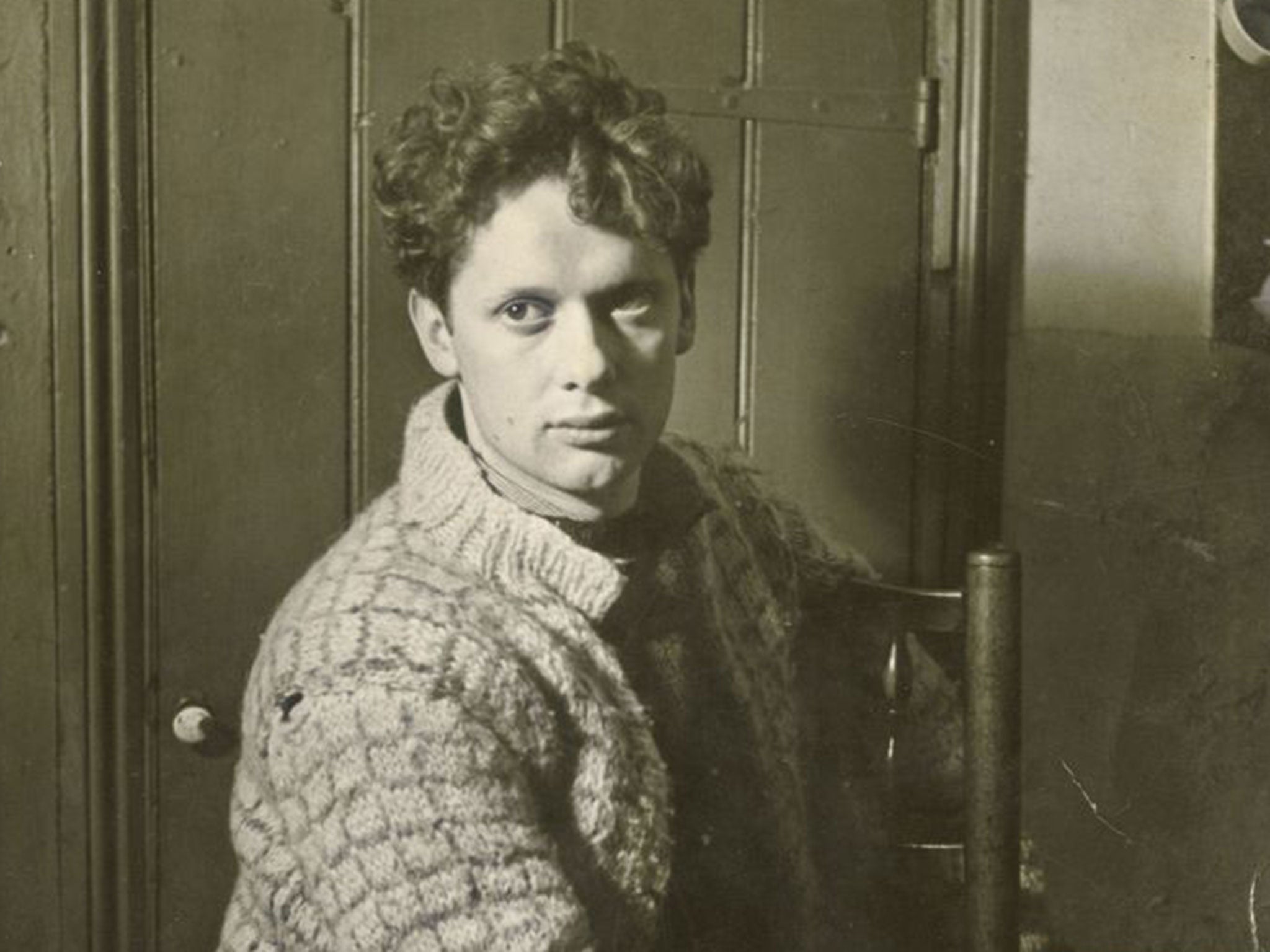All this Dylan Thomas fever is telling us only half the story
Dylan Thomas, the celebrated Welsh poet who raged against the dying of the light, would have had his 100th birthday this month


Your support helps us to tell the story
From reproductive rights to climate change to Big Tech, The Independent is on the ground when the story is developing. Whether it's investigating the financials of Elon Musk's pro-Trump PAC or producing our latest documentary, 'The A Word', which shines a light on the American women fighting for reproductive rights, we know how important it is to parse out the facts from the messaging.
At such a critical moment in US history, we need reporters on the ground. Your donation allows us to keep sending journalists to speak to both sides of the story.
The Independent is trusted by Americans across the entire political spectrum. And unlike many other quality news outlets, we choose not to lock Americans out of our reporting and analysis with paywalls. We believe quality journalism should be available to everyone, paid for by those who can afford it.
Your support makes all the difference.The Dylan Thomas centenary is upon us. Next Monday, the self-styled “Rimbaud of Cwmdonkin Drive” would have been 100 years old – had he lived past 39, and the evening in New York’s White Horse bar when he drank 18 straight whiskies, announced “I think that’s the record”, went into a coma and died a few days later of pneumonia and a distended liver.
Among the centenary celebrations there are two festivals in Swansea; a week-long London extravaganza called “Dylan Thomas in Fitzrovia”, organised by Griff Rhys Jones; a new production of Under Milk Wood by Owen Teale; a radio tribute by Cerys Matthews; plus exhibitions, talks and a “poetry hunt”. As part of the jollifications, Thomas’s famous garden shed, where he wrote much of his verse, has been faithfully replicated in London’s Store Street. The climax of the adulation will be a gala concert at the Queen Elizabeth Hall this Sunday.
I’m surprised there isn’t a schedule of church services to his blessed memory, along with mentions of his work on Thought for the Day and a public recital of Fern Hill by Rowan Williams, the former Archbishop of Canterbury and a huge Thomas fan. I’ve watched all year as attempts have been made to rehabilitate the pint-sized bard and present him as a romantic, roistering, broth-of-a-boyo, good-egg Captain Flashheart figure who's bordering on cultural sainthood, rather than as an alcoholic, wet-brained, bulging-eyed, blubber-lipped narcissist and logorrheic sponger, an incompetent Lothario and mummy’s boy who sought a sympathy shag from every woman he met, especially his friends’ wives, and a poet of narrow range and Victorian subject-matter, cascading a sub-Joycean flood of banging monosyllables, semi-comprehensibly, over rather trite sentiments about childhood, love, nature and death.
Rhys Jones is determined to present Thomas as, effectively, a London character. “For me, he’s as much a London figure as a Welsh figure,” he said on Monday. “When he was [in London], he just seemed to live life to the full.” To the full, eh? This mostly meant heading for the Fitzrovia pubs when they opened at 11am, setting up a line of light ales along the counter and downing them one by one while embarking on his rambling shaggy-dog stories.
Occasionally, he would cease in the middle to say: “Someone’s boring me. I think it’s me.” His idea of a first move with an attractive woman was to lay his head upon her lap, like Hamlet with Ophelia, while talking incessantly about her beauty. As a student I used to think this stuff admirably bardic and Falstaffian, but now, I fear, I think it only tiresome. (And his approaches to women leave Dave Lee Travis on the nursery slopes.) And my God, he could be a pest. He tended to go berserk in fashionable clubs and dance halls. Osbert Sitwell shudderingly recalled the night Thomas came racing into The Gargoyle, the Soho club where the posh and arty used to mingle, and hit the dance floor in tweeds and no socks.
As Sitwell recalled, “He moved on to the table where David Tennant [not that one, obviously] was sitting drinking a valuable bottle of claret, poured it into his own shoe and drank it, finished the bottle and then, with an extraordinary gliding movement, like a sea serpent, traversed the entire floor to the far end of the room and landed on the divan, nestling his head against the thighs of Harold Nicolson, whom he hates”, after which he got in a fight and was thrown out.
He was a difficult friend. His widow Caitlin told a biographer that, if a well-off acquaintance lent the Thomases their flat for a few days, Dylan would nip to the pawnbrokers to exchange fur coats, gramophones and the family silver for drinking money. Once, Theodora Fitzgibbon was walking down her street in Chelsea when she met Dylan carrying her sewing machine.
The truth is, he didn’t like London much. He wrote to Vernon Watkins: “I’ve just come back from three dark days in London, city of the restless dead. It really is an insane city, and filled me with terror… I’m not going to London again for years; its intelligentsia is so hurried in the head that nothing stays there; its glamour smells of goat; there’s no difference between good and bad.”
We should, of course, not allow our judgement of an artist’s work to be clouded by our opinion of him or her as a person. But, as Seamus Heaney wrote: “Dylan Thomas is now as much a case history as a chapter in the history of poetry.” And it’s the case history that’s the focus of all the centenary hoopla. We should be wary of honouring or canonising someone whose monstrous selfishness made such a balls of his talent and his life.
I suppose you can forgive a nun for thinking the best of Madonna...
It’s rarely a smooth ride, being a singing nun. Something’s always bound to go wrong. I was a nine-year-old schoolboy when a Belgian, Dominican nun called Jeanine Deckers (emetically also known as “Sister Smile”) burst upon the world with a song called “Dominique” about the founder of her order. The first lines went: “Domi-nique –nique –nique, s’en allait tout simplement/ Routier, pauvre et chantant” (“Dominic went about simply, a poor singing traveller”) but we horrid boys heard them as “Dominique-knicker-knicker” and sniggered. Blissfully unaware of this, the good sister had her earnings taken by her producer and the convent, recorded a second album, saw it flop, became a social worker, had a breakdown and died in 1985 in a suicide pact with her lesbian lover.

Undeterred by this chronicle of misfortune, Sister Cristina Scuccia, the Sicilian nun who won Italy’s version of The Voice, is releasing an album on which she’ll sing “Like a Virgin”, Madonna’s 1984 hit. The video showed Madonna drifting around Venice in a gondola, gyrating in a saucy vest with a crucifix before subsiding upon a bed in a bridal outfit. Sister Cristina calls it “a song about the capacity of love to make people new again” and says it’s more “a secular prayer than a pop song”.
Well, yes and no, Sister. May I refer you to the opening scene of Reservoir Dogs (a movie you may have missed) when the baddies are chatting in a bar before the heist? Quentin Tarantino, playing Mr Brown, is explaining the lyrics of your favourite song. He argues that it’s about a lady who is, how can I put this, a veteran of sexual activity – but such is the, er, equipment of her new beau that, with him, she feels a discomfort she hasn’t experienced since the, ah, first time. Hence “like a virgin”. No, don’t thank me. Just remember me in your prayers.
Join our commenting forum
Join thought-provoking conversations, follow other Independent readers and see their replies
Comments